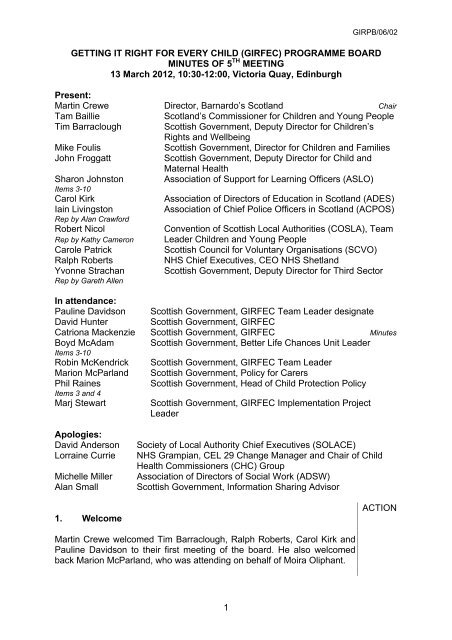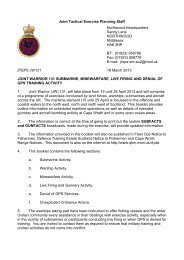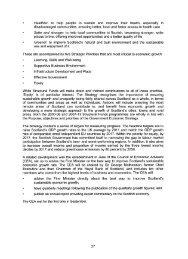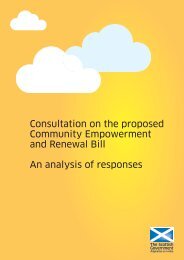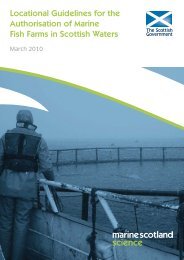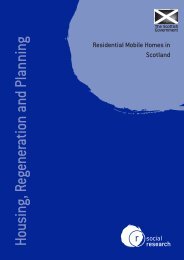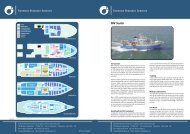13 March 2012 - Scottish Government
13 March 2012 - Scottish Government
13 March 2012 - Scottish Government
Create successful ePaper yourself
Turn your PDF publications into a flip-book with our unique Google optimized e-Paper software.
GIRPB/06/02<br />
GETTING IT RIGHT FOR EVERY CHILD (GIRFEC) PROGRAMME BOARD<br />
MINUTES OF 5 TH MEETING<br />
<strong>13</strong> <strong>March</strong> <strong>2012</strong>, 10:30-12:00, Victoria Quay, Edinburgh<br />
Present:<br />
Martin Crewe Director, Barnardo’s Scotland Chair<br />
Tam Baillie<br />
Scotland’s Commissioner for Children and Young People<br />
Tim Barraclough <strong>Scottish</strong> <strong>Government</strong>, Deputy Director for Children’s<br />
Rights and Wellbeing<br />
Mike Foulis<br />
<strong>Scottish</strong> <strong>Government</strong>, Director for Children and Families<br />
John Froggatt<br />
<strong>Scottish</strong> <strong>Government</strong>, Deputy Director for Child and<br />
Maternal Health<br />
Sharon Johnston Association of Support for Learning Officers (ASLO)<br />
Items 3-10<br />
Carol Kirk<br />
Association of Directors of Education in Scotland (ADES)<br />
Iain Livingston<br />
Association of Chief Police Officers in Scotland (ACPOS)<br />
Rep by Alan Crawford<br />
Robert Nicol<br />
Convention of <strong>Scottish</strong> Local Authorities (COSLA), Team<br />
Rep by Kathy Cameron Leader Children and Young People<br />
Carole Patrick<br />
<strong>Scottish</strong> Council for Voluntary Organisations (SCVO)<br />
Ralph Roberts<br />
NHS Chief Executives, CEO NHS Shetland<br />
Yvonne Strachan <strong>Scottish</strong> <strong>Government</strong>, Deputy Director for Third Sector<br />
Rep by Gareth Allen<br />
In attendance:<br />
Pauline Davidson <strong>Scottish</strong> <strong>Government</strong>, GIRFEC Team Leader designate<br />
David Hunter <strong>Scottish</strong> <strong>Government</strong>, GIRFEC<br />
Catriona Mackenzie <strong>Scottish</strong> <strong>Government</strong>, GIRFEC Minutes<br />
Boyd McAdam <strong>Scottish</strong> <strong>Government</strong>, Better Life Chances Unit Leader<br />
Items 3-10<br />
Robin McKendrick <strong>Scottish</strong> <strong>Government</strong>, GIRFEC Team Leader<br />
Marion McParland <strong>Scottish</strong> <strong>Government</strong>, Policy for Carers<br />
Phil Raines<br />
<strong>Scottish</strong> <strong>Government</strong>, Head of Child Protection Policy<br />
Items 3 and 4<br />
Marj Stewart <strong>Scottish</strong> <strong>Government</strong>, GIRFEC Implementation Project<br />
Leader<br />
Apologies:<br />
David Anderson<br />
Lorraine Currie<br />
Michelle Miller<br />
Alan Small<br />
1. Welcome<br />
Society of Local Authority Chief Executives (SOLACE)<br />
NHS Grampian, CEL 29 Change Manager and Chair of Child<br />
Health Commissioners (CHC) Group<br />
Association of Directors of Social Work (ADSW)<br />
<strong>Scottish</strong> <strong>Government</strong>, Information Sharing Advisor<br />
ACTION<br />
Martin Crewe welcomed Tim Barraclough, Ralph Roberts, Carol Kirk and<br />
Pauline Davidson to their first meeting of the board. He also welcomed<br />
back Marion McParland, who was attending on behalf of Moira Oliphant.<br />
1
GIRPB/06/02<br />
2. Minutes of previous meeting and matters arising<br />
The minutes were agreed (GIRPB/05/02).<br />
Matters arising from the previous meeting’s actions:<br />
• A paper on Getting it right for young people had been tabled for the<br />
board’s consideration (GIRPB/05/07) – see item 8.<br />
• The Maturity Model had been circulated to the board<br />
(GIRPB/05/03a) – see item 3.1.<br />
• Papers providing the board with an update on information sharing,<br />
including iACT had been tabled for the board’s consideration<br />
(GIRPB/05/06 and GIRPB/05/06a) – see item 7.<br />
• A common template for reporting progress on the board’s Action<br />
Plan had been provided and written updates on each of the actions<br />
submitted (GIRPB/05/04) – see item 5.<br />
• The Risk Register had been refreshed (GIRPB/05/05) – see item 6.<br />
3. Highlight Report<br />
The board reviewed the Highlight Report (GIRPB/05/03).<br />
3.1 Maturity Model<br />
Robin McKendrick reported that the Maturity Model (GIRPB/05/03a)<br />
had been finalised and had been circulated to the GIRFEC team’s<br />
contacts within Community Planning Partnerships (CPPs). Many<br />
had been keen to adopt the model, with some choosing to adapt it<br />
to meet local requirements. It had also been shared with CEL 29<br />
Change Managers.<br />
At this stage, the Maturity Model was to be used as guidance to<br />
provide help and support – this could be as a self evaluation tool or<br />
in planning for full implementation of GIRFEC. Implementation<br />
Advisors would report back on how the five priorities identified by<br />
the board in September 2011 were being implemented across<br />
CPPs.<br />
The board expressed some concern that, due to varying levels of<br />
engagement with CPPs, there were varying degrees of accuracy in<br />
reporting progress. More than a few local authorities appeared to<br />
be coming up against barriers for implementation and there was a<br />
challenge for the board as to how the momentum to break through<br />
these barriers could be provided. It was agreed that the Maturity<br />
Model could be used as the basis of describing progress in each<br />
area, that could then be shared with CPPs for their comment as to<br />
accuracy.<br />
Action: GIRFEC team to report to the board on progress against the five<br />
priorities for implementation across CPP areas.<br />
Boyd McAdam<br />
26 June <strong>2012</strong><br />
2
GIRPB/06/02<br />
3.2 Tayside Conference<br />
Robin McKendrick reported that the Minister for Children and<br />
Young People, Aileen Campbell MSP, had attended a conference<br />
for practitioners from agencies across Tayside in Dundee on 6<br />
<strong>March</strong>. The Minister had both made a speech and attended some<br />
of the sessions at the event.<br />
Robin also informed the board that, following this conference,<br />
officials from the GIRFEC team had met with the Minister to update<br />
her on engagement across Scotland. Ms Campbell had endorsed<br />
the programme of work, including grant funding, and had<br />
specifically identified policy on young people as one area within her<br />
portfolio where more needed to be done. The Minister was also<br />
looking for specific opportunities to support GIRFEC<br />
implementation during the summer tours period and officials had<br />
agreed to provide her with another update on progress in February<br />
20<strong>13</strong>.<br />
Action: GIRFEC team to circulate the speech the Minister gave at the<br />
Tayside conference on 6 <strong>March</strong> <strong>2012</strong> to the board for their information.<br />
3.3 Highland Child’s Plan<br />
Boyd McAdam<br />
26 June <strong>2012</strong><br />
Marj Stewart reported that the Additional Support for Learning<br />
Officer in Highland has been leading on a piece of work to refresh<br />
the Child’s Plan (GIRPB/05/03b) for all agencies in the area,<br />
following feedback on the previous version of the plan. Highland<br />
were confident that the revised plan would also meet the<br />
requirements for a Coordinate Support Plan, should it have to go to<br />
tribunal. The plan would appear on the GIRFEC Community of<br />
Practice.<br />
The fact that all the agencies involved had been able to agree on a<br />
single plan was welcomed by board members, who commended<br />
the agencies concerned.<br />
3.4 Police management of concerns<br />
Alan Crawford presented the ACPOS paper on police management<br />
of concerns (GIRPB/05/03c). In particular, he highlighted:<br />
• The high level of referrals to the Children’s Reporter that<br />
came from police sources<br />
• Ensuring appropriate training across all forces to give<br />
officers the skills and confidence in raising a concern about a<br />
child<br />
• Supporting not just front line officers but also their<br />
supervisors, for example through the work being done on<br />
chronologies<br />
3
• The real willingness for 16 and 17 year olds to be kept away<br />
from the criminal justice system and look at diversional<br />
measures<br />
• The ACPOS lead on GIRFEC was expected to be ACC Allan<br />
Moffat, in order to capture the preventive aspect of GIRFEC.<br />
In discussion it was suggested that the consistent rate of 88% of<br />
referrals from the police should be more evenly spread if early<br />
intervention were happening and it would be possible to look at the<br />
differences in referral rates in each local authority area, which were<br />
available through the <strong>Scottish</strong> Children’s Reporter Administration<br />
(SCRA). It was suggested that it might therefore be a good<br />
measure of how implementation of GIRFEC is progressing. The<br />
importance of linking in with housing personnel was also raised, as<br />
they are often the only ones going into a house.<br />
Mike Foulis observed that there was work to extend the Whole<br />
Systems Approach across the country and beyond offence<br />
referrals, and that there seemed to be agreement that, where the<br />
approach was implemented, it had been effective in reducing<br />
timescales and the number of referrals.<br />
3.5 Third sector<br />
Carole Patrick highlighted that there was lots of good practice to<br />
build on and work going on around how to link the Supporting Third<br />
Sector Embedding of GIRFEC Locally National Project with the<br />
Early Years Change Fund.<br />
Gareth Allen reported that the meeting of the Supporting Third<br />
Sector Embedding of GIRFEC Locally National Project Scoping<br />
Group on 14 <strong>March</strong> would focus on the delivery mechanism for the<br />
project, which would allow an update on this to be made to the<br />
board in June.<br />
GIRPB/06/02<br />
Action: Update the board on the delivery mechanism for the Supporting<br />
Third Sector Embedding of GIRFEC Locally National Project.<br />
3.6 Meeting of NHS Change Managers (CEL 29)<br />
Yvonne Strachan<br />
26 June <strong>2012</strong><br />
John Froggatt reported that the meeting of NHS Change Managers<br />
on 29 February had been attended by 12 of the 14 territorial health<br />
boards and all of the special health boards, indicating a good level<br />
of buy-in. The group had received updates on the policy context for<br />
GIRFEC, progress on implementation (which raised awareness of<br />
the support available), GIRFEC in the context of the NHS, the<br />
Maturity Model and the Children’s Services Bill consultation. There<br />
was also feedback from each of the Change Managers on the<br />
challenges within their own areas, the insight from the special<br />
4
oards for instance suggesting that support to them from the<br />
GIRFEC team would be particularly important. The group had<br />
agreed to continue to meet and that the next meeting would be<br />
more structured to address specific issues.<br />
Ralph Roberts commented that four of the main themes that had<br />
come out of the updates from Change Managers had been:<br />
engaging with other services, such as maternity and adult services;<br />
information sharing and paperwork; culture; and training.<br />
3.7 Scrutiny of children’s services<br />
Phil Raines updated the board on the current position with regard to<br />
scrutiny of children’s services, highlighting:<br />
• The current round of inspections was due to come to an end<br />
in June <strong>2012</strong><br />
• The methodology for the new integrated children’s services<br />
inspections was being developed by the Care Inspectorate,<br />
based on GIRFEC principles<br />
• Testing would take place in Angus during April and May to<br />
develop the methodology further<br />
• There would be six or seven pilots of the new methodology,<br />
starting in July<br />
• There would be consultation around the country on the new<br />
inspections during April and May.<br />
4. Update on legislation<br />
Phil Raines provided an update to the board on children’s legislation. Two<br />
key pieces of legislation had been announced: the Rights of Children and<br />
Young People Bill, for which the <strong>Scottish</strong> <strong>Government</strong> response to the<br />
consultation was still pending; and the Children’s Services Bill, which had<br />
been the focus of work over the past couple of months and looked likely to<br />
be called the Children and Young People Bill. This second bill would be a<br />
vehicle for implementing GIRFEC and introducing practical changes in the<br />
delivery of services. Current thinking was that the consultation on the<br />
policy behind the services bill was likely to take place after local authority<br />
elections with a view to the production of a draft bill in spring 20<strong>13</strong>.<br />
5. Programme Board Action Plan<br />
Martin Crewe presented the progress report on the board’s Action Plan<br />
(GIRPB/05/04), stressing that he would be looking for Programme Board<br />
leads to be reporting personally to the board at future meetings. He invited<br />
comments on the progress report.<br />
The following points were raised in discussion:<br />
• In response to the challenge identified in Objective 1 around the<br />
Community of Practice, it was suggested the change that<br />
GIRPB/06/02<br />
5
Communities of Practice were undergoing would be an opportunity<br />
to refresh engagement in this area.<br />
• The timing in Objective 2 may not be right as there is the possibility<br />
of political change within COSLA following elections, though this<br />
should not prevent the board being aware of the importance of<br />
engagement with local authorities and COSLA.<br />
• The words “pour encourager les autres” in action 7.1 could be<br />
taken negatively.<br />
• Some of the outcomes identified in the report were perhaps too<br />
focused on process.<br />
• The board should recognise that CPPs and local authorities would<br />
continue to progress in different ways at different paces and that<br />
the adaptability of the Maturity Model reflected this.<br />
• Rod Harrison, Children and Families Analysis at the <strong>Scottish</strong><br />
<strong>Government</strong>, was undertaking a piece of work to draw out from the<br />
range of outcome frameworks key outcomes which were most<br />
important to improving children’s lives.<br />
6. Risk and Issue Register<br />
Robin McKendrick presented the risk register (GIRPB/05/05), bringing to<br />
the board’s attention that the narrative had been updated and the register<br />
had been re-scored to reflect developments.<br />
The board noted the register and remarked on the particular challenges<br />
associated with risk 7.<br />
7. Information Sharing<br />
Boyd McAdam presented the paper updating the board on information<br />
sharing, including the inter-Agency Communications Tool (iACT)<br />
(GIRPB/05/06). He reported that iACT is being reviewed as part of a wider<br />
review of eCare, which coincides with the development of the eHealth and<br />
Social Care strategy. The Data Sharing Technologies Board (DSTB) had<br />
been created to advise on technology which might support information<br />
sharing across Health and Social Care services. The policy responsibility<br />
for information sharing for children and young people continued to rest<br />
with the GIRFEC Programme Board. Boyd highlighted the work of the<br />
GIRFEC team in providing guidance on chronologies<br />
In line with the Board’s responsibilities, he presented the business<br />
requirements for information sharing to support the GIRFEC approach as<br />
agreed by the iACT Advisory Group (iAG) (GIRPB/05/06a). The majority of<br />
these requirements represented what was essential from a GIRFEC<br />
perspective, with a significant minority of the requirements being<br />
necessary to make it attractive to practitioners. Not everything sought by<br />
practitioners had been incorporated in to the business requirements,<br />
following discussion with the Advisory Group.<br />
GIRPB/06/02<br />
6
Following discussion, the Board agreed to recommend the minimum<br />
business requirements with the following amendment:<br />
• Page 9, section 3.4, second paragraph, first sentence – the words<br />
“of school age” to be deleted so the sentence reads “To ensure that<br />
the need for support is identified and early intervention can be<br />
undertaken with the aim of preventing escalation towards crisis<br />
every child will have a Named Person.”<br />
The Board also requested that senior officers across Data Sharing<br />
Partnerships be invited to endorse the minimum business requirements<br />
GIRPB/06/02<br />
Action: GIRFEC team to circulate the business requirements<br />
recommended by the board to all relevant agencies at the most senior<br />
level for their agreement as minimum business requirements.<br />
Boyd reported that, in order to inform the Board on options and costs of<br />
further development of iACT, a gap analysis was being explored. The cost<br />
of such an analysis would not be available until mid-April but, subject to<br />
resources being available, he advised that the gap analysis - based on the<br />
business requirements as amended - would proceed. The GIRFEC team<br />
would report to the Board on progress, if necessary seeking the Board’s<br />
approval if affordability of the gap analysis became an issue and limited<br />
the Board’s ability to explore options. With more robust information the<br />
Board would be better placed to decide whether a business case for the<br />
further development of iACT should be prepared or whether alternative<br />
systems to iACT should be explored to support information sharing.<br />
Boyd McAdam<br />
30 April <strong>2012</strong><br />
The Board endorsed the proposed course of action<br />
In discussion, the Board recognised the efforts of local areas to produce IT<br />
solutions for information sharing but felt that there was also a need to<br />
share across boundaries, meaning the board would need to consider<br />
whether it should be prescriptive on certain elements of any solution.<br />
Further, any IT solution should support rather than reduce communication.<br />
Action: GIRFEC team to –<br />
Boyd McAdam<br />
• report to the board’s on progress on the gap analysis 30 April <strong>2012</strong><br />
• seek in writing the Board’s views on how to progress if the<br />
affordability of the gap analysis became an issue in the opinion of<br />
the GIRFEC team 30 April <strong>2012</strong><br />
• report to the Board once the gap analysis is available on<br />
- the likely resources to develop iACT as a system to support<br />
information sharing and how such development might be funded<br />
- alternative options. For information systems and the likelihood<br />
- whether there was a likelihood of getting buy-in from<br />
stakeholders for the iACT system if developed and/or alternative<br />
systems 26 June <strong>2012</strong><br />
• advise the Board on options for being more prescriptive in order to<br />
ensure cross-boundary sharing of information 26 June <strong>2012</strong><br />
7
GIRPB/06/02<br />
8. Getting it right for young people<br />
David Hunter presented the paper on young people (GIRPB/05/07),<br />
highlighting:<br />
• The Minister for Children and Young People’s desire to see<br />
progress in this part of her portfolio<br />
• A paper relating on young people from a More Choices More<br />
Chances was expected from Bobby McDowall, a former member of<br />
the GIRFEC team<br />
• The work set out in the paper was more about joining up and<br />
making the most of existing work than creating new work.<br />
The board raised the concern that, with the additional range of issues<br />
presented by extending into young adults and the existing challenges in<br />
implementing GIRFEC, becoming more heavily engaged on this age<br />
group may lead to a loss of focus. It was, however, agreed that exploring<br />
the territory would be worthwhile. David emphasised that the Minister had<br />
clearly expressed a wish to see progress made in this area, which she felt<br />
had been somewhat neglected, (see section 3.2) and also that most of the<br />
work involved would take the form of joining up and making more<br />
productive workstreams already ongoing.<br />
The board agreed to the proposed work plan set out in the paper and<br />
nominated Martin Crewe as the board member who would work with the<br />
group taking the work forward.<br />
9. Any other business<br />
9.1 Young Carers<br />
Marion McParland submitted a paper to update the board on<br />
progress in young carers policy (GIRPB/05/08). She sought the<br />
board’s views on whether young carers were being involved in<br />
GIRFEC and whether staff were able to support young carers within<br />
GIRFEC, including through having access to the appropriate<br />
training.<br />
The board highlighted that:<br />
• In some areas, schools were often unaware whether a pupil<br />
was a young carer unless they were already known to social<br />
services<br />
• The report to parliament from Scotland’s Commissioner for<br />
Children and Young People would contain some relevant<br />
information<br />
• In areas where the role of the Named Person was more<br />
mature, there was an emerging pattern of earlier<br />
identification of young carers<br />
• Implementation Advisors within the GIRFEC team could pick<br />
up on the point of young carers as part of their usual<br />
engagement.<br />
8
GIRPB/06/02<br />
9.2 Robin McKendrick’s retirement<br />
Martin Crewe informed the board that Robin McKendrick would<br />
shortly be retiring and would be replaced by Pauline Davidson. He<br />
thanked Robin McKendrick for his support to the board and wished<br />
him well in his retirement.<br />
10. Date of next meeting<br />
The date of the next meeting was set for 26 June <strong>2012</strong>.<br />
9


